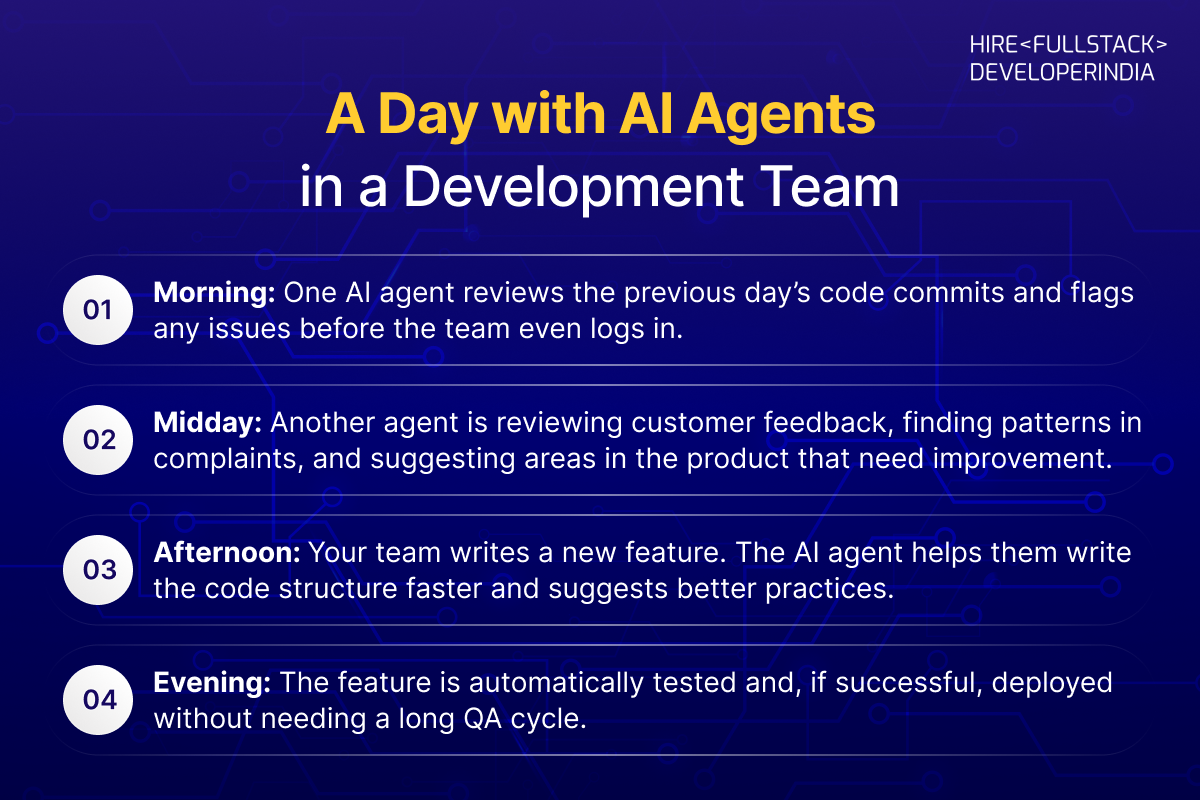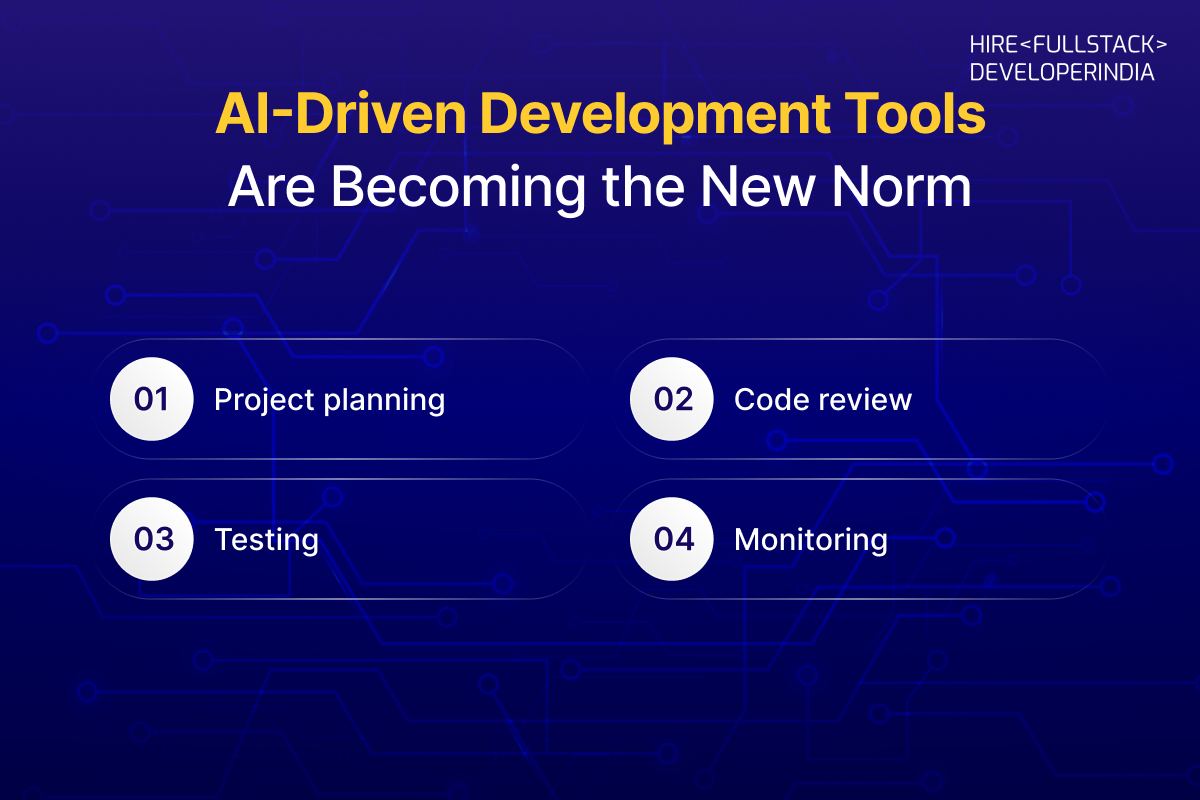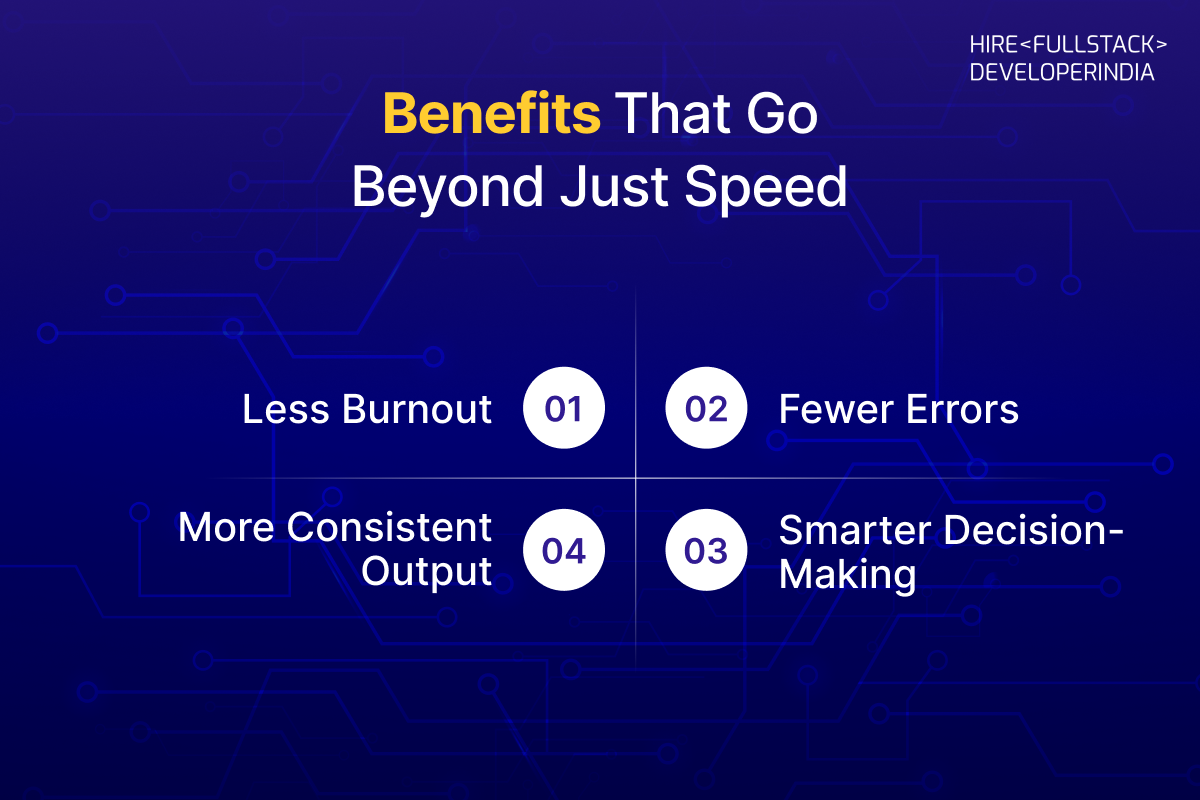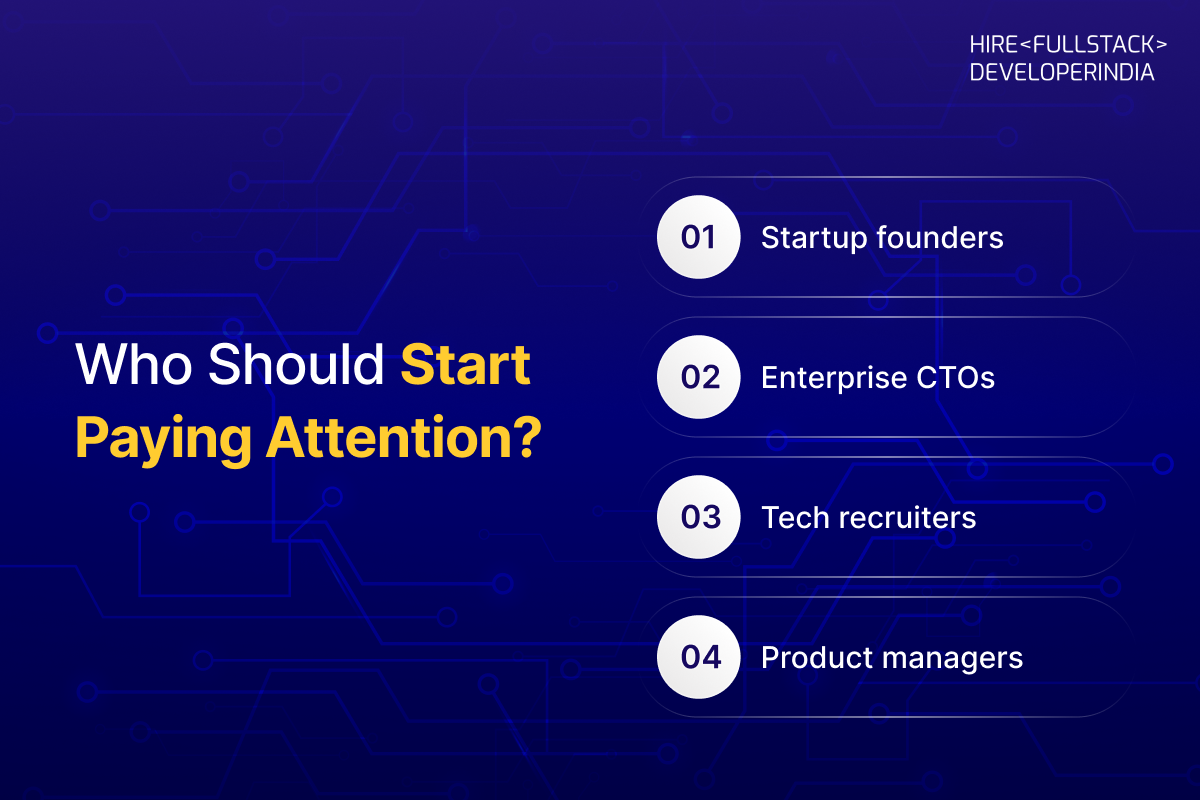Software development isn't what it used to be. Just a few years ago, teams were writing lines of code manually, reviewing every bug report by hand, and moving tasks across boards in long meetings. But 2025 tells a very different story—one where AI agents in software development are helping developers get more done, faster and with better accuracy.
Let’s talk about what’s really changing—and how AI-driven development tools and autonomous workflows are now shaping the future of software development.
What Are AI Agents in Software Development?
Think of AI agents as smart virtual teammates. These are not robots with arms and legs, but rather software systems that can understand, decide, and act on tasks—just like a developer would.
For example:
- You want a login feature in your app? An AI agent can write the first draft of the code.
- You have bugs piling up? It can detect them, suggest fixes, and sometimes fix them without asking.
- Need to test your software? The AI agent can write and run test cases automatically.
These agents work continuously in the background, helping the team without getting tired or needing reminders.
Why Developers Are Embracing This Shift
There’s no hype here. Developers are embracing AI agents because they solve very real problems:
- They reduce repetitive tasks like writing boilerplate code.
- They can analyze tons of data from past projects to suggest smarter solutions.
- They help spot errors before they become big issues.
Instead of replacing developers, they’re helping them focus on what humans do best—thinking creatively, solving complex logic, and building unique user experiences.
How Autonomous Workflows Are Changing Daily Development Routines
Now let’s talk about autonomous workflows—the system behind the scenes that keeps things running smoothly with minimal human touchpoints.
Here’s what this looks like in simple terms:
- A developer pushes code.
- The system automatically checks the quality.
- If the code passes, it gets deployed.
- If it fails, it rolls back, notifies the team, and suggests improvements.
All of this happens without anyone needing to manage each step manually.
This isn't just automation—this is autonomy. It doesn’t need human supervision for each task. It just works. This is one of the biggest differences we’re seeing in the future of software development.
A Day with AI Agents in a Development Team

Let’s say you’re running a small startup. You have three developers, and time is tight. Here’s how AI agents in software development could fit into your workflow:
Morning: One AI agent reviews the previous day’s code commits and flags any issues before the team even logs in.
Midday: Another agent is reviewing customer feedback, finding patterns in complaints, and suggesting areas in the product that need improvement.
Afternoon: Your team writes a new feature. The AI agent helps them write the code structure faster and suggests better practices.
Evening: The feature is automatically tested and, if successful, deployed without needing a long QA cycle.
No delays. No extra meetings. And developers can focus more on creating than fixing.
AI-Driven Development Tools Are Becoming the New Norm

These tools go beyond just code suggestions. They’re getting smarter in handling core software tasks like:
Project planning: Tools like Jira with AI integrations and Linear use historical data to estimate effort and delivery timelines more accurately.
Code review: Platforms like DeepCode, Codacy, and Amazon CodeGuru can flag bugs, inefficiencies, and even potential security vulnerabilities in real-time.
Testing: Tools like Testim, Mabl, and Functionize can automatically generate, run, and maintain test cases with very little human input.
Monitoring: AI-powered observability platforms like Datadog, Dynatrace, and New Relic not only track performance but also detect issues and suggest fixes before they affect users.
These aren’t tools that sit idle—they work actively alongside the team. The goal is not just faster development, but also better quality with fewer bugs and more stable performance.
Benefits That Go Beyond Just Speed

Let’s be honest—every business wants faster results. But the benefits of this new approach go deeper than speed:
Less burnout: Developers spend less time on mind-numbing repetitive tasks.
Fewer errors: Early detection reduces post-launch firefighting.
More consistent output: The software is more reliable, regardless of who’s working on it.
Smarter decision-making: AI tools analyze what’s working and what’s not, and share that insight in plain language.
For startup founders and CTOs, this means tighter feedback loops, shorter development cycles, and more predictable outcomes.
Is It Complicated to Start Using AI Agents?
Not at all. Getting started with AI agents in software development is easier than most people think.
Many popular platforms already have these features built-in. Tools like GitHub Copilot, Amazon CodeWhisperer, Google Gemini Code Assist, and Microsoft IntelliCode are ready to use with just a few clicks. You don’t need a dedicated AI team or deep machine learning knowledge to benefit from them.
You can begin with just one or two small areas—like using AI to suggest code snippets, auto-complete functions, or automate your testing routines. As you get comfortable, you can expand it to other tasks and slowly create a workflow that runs almost on autopilot.
And it's not just theory—thousands of teams across industries are already doing it.
- GitHub shared that over 1.3 million developers now use Copilot daily, and it’s contributing to 40% or more of the code in some projects.
- Amazon CodeWhisperer is being used by engineering teams to generate secure code, especially in finance and enterprise environments.
- Shopify has integrated Copilot to help engineers save time during feature development and cut down on repetitive tasks.
- Data from JetBrains 2024 survey shows nearly 30% of developers worldwide are already working with AI tools actively in their day-to-day workflows.
So whether you're part of a startup team or leading enterprise projects, these tools are already tested, trusted, and being used in real-world environments.
In short: it's simple to get started, and smart to start now.
But What About Human Developers?
A common question that always comes up is: will AI replace developers?
Here’s the simple answer: No. Developers are still needed—and more than ever.
These tools are helpers, not decision-makers. They don’t have context, they don’t understand user behavior like humans do, and they don’t build creative interfaces from scratch. They handle the heavy lifting in the background so humans can focus on designing smart, scalable, and user-friendly products.
Think of AI agents as junior developers who are great at doing the groundwork but still need human guidance.
How the Future of Software Development Looks with AI and Autonomy
By 2025, software development has become a collaborative space where humans and AI work side-by-side. Here's what’s becoming common:
- Smaller teams delivering bigger outcomes.
- Fewer meetings, more doing.
- Instant feedback on every line of code.
- Workflows that run 24/7 without burning out anyone.
This shift is especially useful for startups or companies with lean tech teams. You no longer need a massive engineering department to build and maintain powerful apps or digital products.
Who Should Start Paying Attention?

If you fall into any of these categories, now is the time to explore AI agents in software development:
- Startup founders: To stay lean and move fast.
- Enterprise CTOs: To bring efficiency into large, complex systems.
- Tech recruiters: To understand the new skills developers need.
- Product managers: To deliver better features, faster.
Even if you're not writing code yourself, understanding this new way of working can help you build better products and teams.
Final Thoughts: Let AI Handle the Routine, Let Humans Create the Vision
Software development in 2025 is no longer about who can write the most code. It’s about who can build smarter—by combining human creativity with machine efficiency.
AI agents in software development aren’t a threat—they’re an opportunity. An opportunity to spend less time fixing, and more time creating. An opportunity to let teams work without being slowed down by every small task. And most importantly, an opportunity to rethink what a development team looks like and what it can achieve.
If you’ve been waiting to try AI-driven development tools or explore autonomous workflows, now’s the time. Start small. Pick one area. Let the results guide you.
The future of software development is not distant—it’s already here. And it’s working quietly behind the scenes, helping developers build the next generation of apps, systems, and solutions.
.png?w=1920&q=75)

